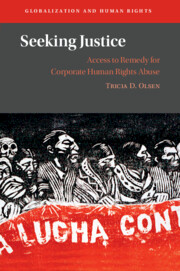Book contents
- Seeking Justice
- Globalization and Human Rights
- Seeking Justice
- Copyright page
- Dedication
- Contents
- Figures
- Tables
- Preface and Acknowledgments
- Abbreviations
- 1 Human Rights in the Corporate Context
- 2 Varieties of Remedy
- 3 The Corporations and Human Rights Database
- 4 How Contestation Shapes Access to Judicial Remedy Mechanisms
- 5 How Contestation Shapes Access to Non-Judicial Remedy Mechanisms
- 6 Does It Work?
- 7 Conclusion
- Appendices
- References
- Index
- Books in the Series
6 - Does It Work?
How Contestation Shapes Democratic Practices
Published online by Cambridge University Press: 09 June 2023
- Seeking Justice
- Globalization and Human Rights
- Seeking Justice
- Copyright page
- Dedication
- Contents
- Figures
- Tables
- Preface and Acknowledgments
- Abbreviations
- 1 Human Rights in the Corporate Context
- 2 Varieties of Remedy
- 3 The Corporations and Human Rights Database
- 4 How Contestation Shapes Access to Judicial Remedy Mechanisms
- 5 How Contestation Shapes Access to Non-Judicial Remedy Mechanisms
- 6 Does It Work?
- 7 Conclusion
- Appendices
- References
- Index
- Books in the Series
Summary
Engaging directly with agonistic thought, Chapter 6 asks whether contestation about corporate human rights abuses, over the long-term, shapes democratic institutions more broadly. What is clear in agonistic scholarship is that confrontation must be incorporated or integrated into democratic institutions. This chapter empirically tests this relationship. It finds that contestation improves measures of respect for human rights and civic empowerment. That is, without any formal or informal response, simply speaking out and making abuses known improves respect for human rights, generally. The data also illustrate that, regardless of the outcome, there is a positive cumulative effect of trials over time, demonstrating the importance of reflexive innovation. In contrast, simply engaging in non-judicial remedy alone does not improve respect for human rights. The analysis shows that there is a positive, cumulative relationship between respect for human rights and those non-judicial remedy efforts led by the state. If corporations lead the non-judicial remedy effort, however, they do nothing to improve respect for human rights or more robust civic engagement over the long-term.
Keywords
- Type
- Chapter
- Information
- Seeking JusticeAccess to Remedy for Corporate Human Rights Abuse, pp. 143 - 165Publisher: Cambridge University PressPrint publication year: 2023



